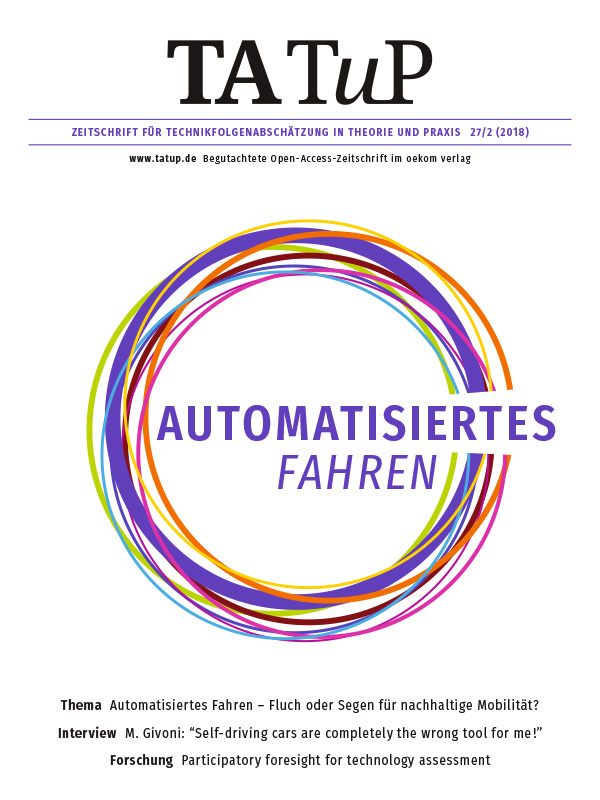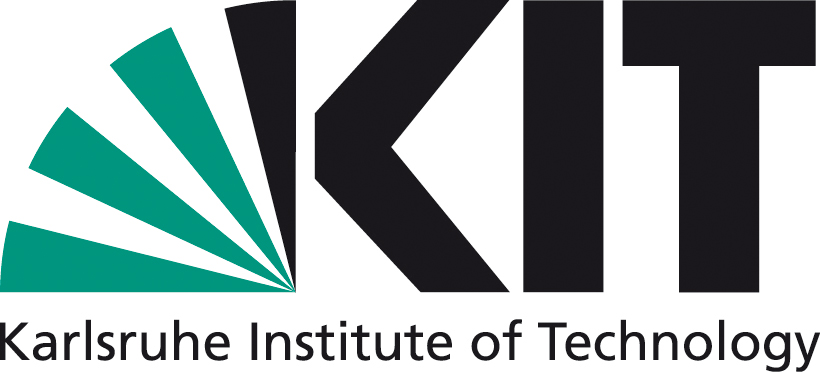Is automated driving sustainable?
Development trends and research considerations in view of low acceptance rates
DOI:
https://doi.org/10.14512/tatup.27.2.16Keywords:
driver assistance systems, automated driving, acceptance, sustainabilityAbstract
Automated driving is currently viewed with great skepticism. A disruptive strategy for the introduction of (fully) automated driving could therefore be met with a lack of acceptance. To avoid this, evolutionary strategies aim to create familiarity, trust, and thus acceptance among the prospective users through the development of adaptive driver assistance systems. However, the preliminary results of a pilot study raise doubts about the sustainability of this strategy.
References
Arndt, Stephanie (2011): Evaluierung der Akzeptanz von Fahrerassistenzsystemen. Modell zum Kaufverhalten von Endkunden. Wiesbaden: VS Verlag für Sozialwissenschaften. DOI: https://doi.org/10.1007/978-3-531-93197-5
Backhaus, Klaus; Erichson, Bernd; Plinke, Wulff; Weiber, Rolf (2015): Multivariate Analysemethoden. Eine anwendungsorientierte Einführung. Berlin: Springer.
Bertelsmann (2017): Automatisiertes Fahren. Aktuelle Einstellungen in Deutschland. Gütersloh: Bertelsmann-Stiftung. Online verfügbar unter https://www.bertelsmann-stiftung.de/fileadmin/files/BSt/Publikationen/GrauePublikationen/Factsheet_LK_Automatisiertes-Fahren_Aktuelle-Einstellungen-in-Deutschland_2017.pdf, zuletzt geprüft am 08. 05. 2018.
Dannheim, Clemens; Mader, Markus; Icking, Christian; Loewenau, Jan; Massow, Kay (2013): A novel approach for the enhancement of cooperative ACC by deriving real time weather information. 16th International IEEE Conference on Intelligent Transportation Systems, ITSC 2013. The Hague, New York: IEEE, S. 2207–2211. DOI: https://doi.org/10.1109/ITSC.2013.6728555
Deloitte (2017): What’s ahead for fully autonomous driving. Consumer opinions on advanced vehicle technology. Online verfügbar unter https://www2.deloitte.com/content/dam/Deloitte/de/Documents/manufacturing/us-manufacturing-consumer-opinions-on-advanced-vehicle-technology.pdf, zuletzt geprüft am 08. 05. 2018.
Enquete-Kommission (1998): Abschlussbericht der Enquete-Kommission „Schutz des Menschen und der Umwelt – Ziele und Rahmenbedingungen einer nachhaltig zukunftsverträglichen Entwicklung“. Deutscher Bundestag: Drucksache 13/11200. Online verfügbar unter http://dipbt.bundestag.de/doc/btd/13/112/1311200.pdf, zuletzt geprüft am 08. 05. 2018.
Ernst & Young (2017): Autonomes Fahren in Deutschland. Ergebnisse einer Befragung von 1.000 Verbrauchern. Eschborn: Ernst & Young GmbH. Online verfügbar unter http://www.ey.com/Publication/vwLUAssets/ey-autonomes-fahren-in-deutschland/$FILE/ey-autonomes-fahren-in-deutschland.pdf, zuletzt geprüft am 08. 05. 2018.
Flick, Uwe (2016): Qualitative Sozialforschung. Eine Einführung. Hamburg: Rowohlt.
Fraedrich, Eva; Lenz, Barbara (2014): Autonomes Fahren. Mobilität und Auto in der Welt von morgen. Ausblick zur Akzeptanz des autonomen Fahrens im Projekt „Villa Ladenburg“ der Daimler und Benz Stiftung. In: TATuP – Zeitschrift für Technikfolgenabschätzung in Theorie und Praxis 23 (1), S. 46–53. DOI: https://doi.org/10.14512/tatup.23.1.46
Haböck, Ulrich; Klier, Janina; Schwenninger, Jochen; Maier, Stefan (2016): Systemadaption als Schlüssel für das automatisierte Fahren. In: Automobiltechnische Zeitschrift (ATZ) 118 (4), S. 26–31. DOI: https://doi.org/10.1007/s35148-016-0036-y
Hartwich, Franziska; Beggiato, Matthias; Krems, Josef F. (2018): Driving comfort, enjoyment, and acceptance of automated driving. Effects of drivers’ age and driving style familiarity. In: Ergonomics. DOI: https://doi.org/10.1080/00140139.2018.1441448
Haug, Sonja et al. (2017): Identifikation von Fahrtypen. Ein empirischer Ansatz zur Klassifikation von Fahrtypen anhand von Selbst- und Fremdwahrnehmung bei Testfahrten. Begleitstudie zur Entwicklung eines adaptiven Fahrassistenzsystems. Beitrag zur 2. OTH Forschungsclusterkonferenz, OTH Regensburg, 18. 01. 2017, Tagungsdokumentation, S. 176–181. Online verfügbar unter https://www.elektromobilitaet-regensburg.de/uploads/media/Haug_u.a._2017_Projekt_Fahrtypen_-_Beitrag_OTH_Clustertagung_2017.pdf, zuletzt geprüft am 08. 05. 2018.
König, Winfried; Weiß, Karl-Ernst; Mayser, Christoph; (2002): S.A.N.T.O.S. – Projekt. Situations-angepasste und Nutzer-Typ-zentrierte Optimierung von Systemen zur Fahrerunterstützung. Online verfügbar unter http://edok01.tib.uni-hannover.de/edoks/e01fb02/373006306.pdf, zuletzt geprüft am 08. 05. 2018.
Lohre, Dirk; Bernecker, Tobias; Stock, Wilfried, Düsseldorf, Karl (2014): ZF-Zukunftsstudie Fernfahrer 2.0. Der Mensch im Transport- und Logistikmarkt. Heilbronn: Institut für Nachhaltigkeit in Verkehr und Logistik der Hochschule Heilbronn. Online verfügbar unter http://www.zf-zukunftsstudie.de/wp-content/uploads/2014/08/ZF-Zukunftsstudie-2014-Gesamt.pdf, zuletzt geprüft am 08. 05. 2018.
Pauli, Christine (2014): Ratingverfahren. In: Journal für LehrerInnenbildung 6 (1), S. 56–59.
Payre, William; Cestac, Julia; Delhomme, Patricia (2014): Intention to use a fully automated car. Attitudes and a priori acceptability. In: Vehicle Automation and Driver Behaviour 27 (Part B), S. 252–263. DOI: https://doi.org/10.1016/j.trf.2014.04.009
Reagan, Ian; Cicchino, Jessica; Kerfoot, Laura; Weast, Rebecca (2018): Crash avoidance and driver assistance technologies. Are they used? In: Transportation Research Part F: Traffic Psychology and Behaviour 52, S. 176–190. DOI: https://doi.org/10.1016/j.trf.2017.11.015
Schnell, Rainer; Hill, Paul; Esser, Elke (2013): Methoden der empirischen Sozialforschung. München: Oldenbourg.
Verberne, Frank; Ham, Jaap; Midden, Cees (2012): Trust in smart systems. Sharing driving goals and giving information to increase trustworthiness and acceptability of smart systems in cars. In: Human Factors 54 (5), S. 799–810. DOI: https://doi.org/10.1177/0018720812443825
Wang, Jianqiang; Li, Keqiang; Zhang, Dezhao; Zhang, Lei; (2014): An adaptive longitudinal driving assistance system based on driver characteristics. In: IEEE Transactions on Intelligent Transportation Systems 14 (1), S. 1–12. DOI: https://doi.org/10.1109/TITS.2012.2205143
Woisetschläger, David (2015): Machtauswirkungen des automatisierten Fahrens. In: Markus Maurer, Christian Gerdes, Barbara Lenz und Hermann Winner (Hg.): Autonomes Fahren. Technische, rechtliche und gesellschaftliche Aspekte. Berlin: Springer Vieweg, S. 709–732. DOI: https://doi.org/10.1007/978-3-662-45854-9_32
Downloads
Published
How to Cite
Issue
Section
License
Copyright (c) 2018 Karsten Weber, Sonja Haug

This work is licensed under a Creative Commons Attribution 4.0 International License.








